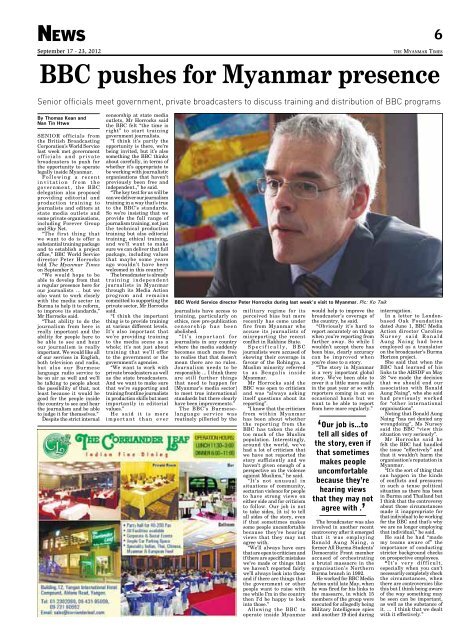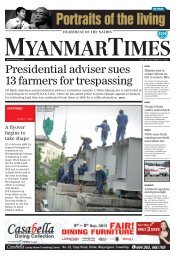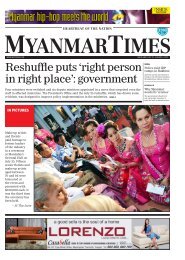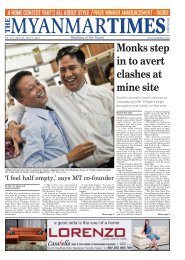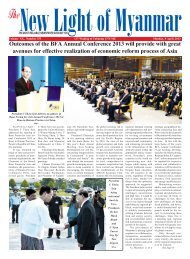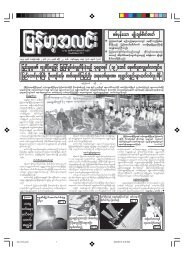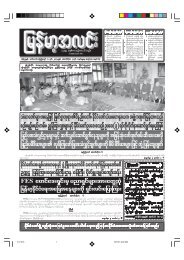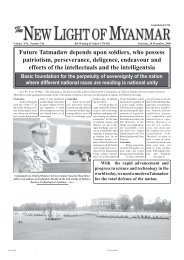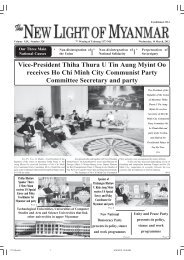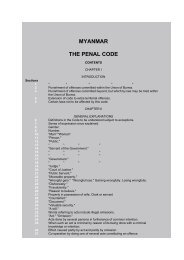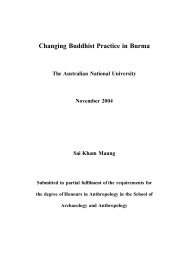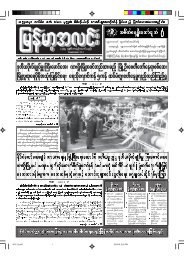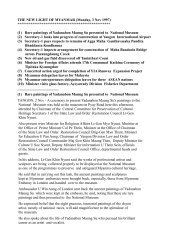'Help us build a new Myanmar' - Online Burma Library
'Help us build a new Myanmar' - Online Burma Library
'Help us build a new Myanmar' - Online Burma Library
You also want an ePaper? Increase the reach of your titles
YUMPU automatically turns print PDFs into web optimized ePapers that Google loves.
<strong>new</strong>s<br />
September 17 - 23, 2012<br />
By Thomas Kean and<br />
Nan Tin Htwe<br />
SENIOR officials from<br />
the British Broadcasting<br />
Corporation’s World Service<br />
last week met government<br />
officials and private<br />
broadcasters to p<strong>us</strong>h for<br />
the opportunity to operate<br />
legally inside Myanmar.<br />
Following a recent<br />
invitation from the<br />
government, the BBC<br />
delegation also proposed<br />
providing editorial and<br />
production training to<br />
journalists and editors at<br />
state media outlets and<br />
some private organisations,<br />
including Forever Group<br />
and Sky Net.<br />
“The first thing that<br />
we want to do is offer a<br />
substantial training package<br />
and to establish a project<br />
office,” BBC World Service<br />
director Peter Horrocks<br />
told The Myanmar Times<br />
on September 8.<br />
“We would hope to be<br />
able to develop from that<br />
a regular presence here for<br />
our journalists … but we<br />
also want to work closely<br />
with the media sector in<br />
<strong>Burma</strong> to help it to reform,<br />
to improve its standards,”<br />
Mr Horrocks said.<br />
“That ability to do the<br />
journalism from here is<br />
really important and the<br />
ability for people here to<br />
be able to see and hear<br />
our journalism is really<br />
important. We would like all<br />
of our services in English,<br />
both television and radio,<br />
but also our Burmese<br />
language radio service to<br />
be on air as well and we’ll<br />
be talking to people about<br />
the possibility of that, not<br />
least beca<strong>us</strong>e it would be<br />
good for the people inside<br />
the country to see and hear<br />
the journalism and be able<br />
to judge it for themselves.”<br />
Despite the strict internal<br />
censorship at state media<br />
outlets, Mr Horrocks said<br />
the BBC felt “the time is<br />
right” to start training<br />
government journalists.<br />
“I think it’s partly the<br />
opportunity is there, we’re<br />
being invited, but it’s also<br />
something the BBC thinks<br />
about carefully, in terms of<br />
whether it’s appropriate to<br />
be working with journalistic<br />
organisations that haven’t<br />
previo<strong>us</strong>ly been free and<br />
independent.,” he said.<br />
“The key test for <strong>us</strong> will be<br />
can we deliver our journalism<br />
training in a way that’s true<br />
to the BBC’s standards.<br />
So we’re insisting that we<br />
provide the full range of<br />
journalism training, not j<strong>us</strong>t<br />
the technical production<br />
training but also editorial<br />
training, ethical training,<br />
and we’ll want to make<br />
sure we can deliver that full<br />
package, including values<br />
that maybe some years<br />
ago wouldn’t have been<br />
welcomed in this country.”<br />
The broadcaster is already<br />
training independent<br />
journalists in Myanmar<br />
through its Media Action<br />
program and remains<br />
committed to supporting the<br />
private sector, Mr Horrocks<br />
said.<br />
“I think the important<br />
thing is to provide training<br />
at vario<strong>us</strong> different levels.<br />
It’s also important that<br />
we’re providing training<br />
to the media scene as a<br />
whole; it’s not j<strong>us</strong>t about<br />
training that we’ll offer<br />
to the government or the<br />
government’s agencies.<br />
“We want to work with<br />
private broadcasters as well<br />
as the state broadcasters.<br />
And we want to make sure<br />
that we’re supporting and<br />
training frontline journalists<br />
in production skills but most<br />
importantly in editorial<br />
values.”<br />
He said it is more<br />
important than ever<br />
journalists have access to<br />
training, particularly on<br />
ethics, now pre-publication<br />
censorship has been<br />
abolished.<br />
“It’s important for<br />
journalists in any country<br />
where the media suddenly<br />
becomes much more free<br />
to realise that that doesn’t<br />
mean there are no rules.<br />
Journalism needs to be<br />
responsible … I think there<br />
are still further things<br />
that need to happen for<br />
[Myanmar’s media sector]<br />
to meet true international<br />
standards but there clearly<br />
have been improvements.”<br />
The BBC’s Burmeselanguage<br />
service was<br />
routinely pilloried by the<br />
military regime for its<br />
perceived bias but more<br />
recently has come under<br />
fire from Myanmar who<br />
acc<strong>us</strong>e its journalists of<br />
misreporting the recent<br />
conflict in Rakhine State.<br />
Specifically, BBC<br />
journalists were acc<strong>us</strong>ed of<br />
skewing their coverage in<br />
favour of the Rohingya, a<br />
M<strong>us</strong>lim minority referred<br />
to as Bengalis inside<br />
Myanmar.<br />
Mr Horrocks said the<br />
BBC was open to criticism<br />
and was “always asking<br />
itself questions about its<br />
reporting”.<br />
“I know that the criticism<br />
from within Myanmar<br />
has been about whether<br />
the reporting from the<br />
BBC has taken the side<br />
too much of the M<strong>us</strong>lim<br />
population. Interestingly,<br />
around the world, we’ve<br />
had a lot of criticism that<br />
we have not reported the<br />
story sufficiently and we<br />
haven’t given enough of a<br />
perspective on the violence<br />
against M<strong>us</strong>lims,” he said.<br />
“It’s not un<strong>us</strong>ual in<br />
situations of community,<br />
sectarian violence for people<br />
to have strong views on<br />
either side and for criticism<br />
to follow. Our job is not<br />
to take sides, [it is] to tell<br />
all sides of the story, even<br />
if that sometimes makes<br />
some people uncomfortable<br />
beca<strong>us</strong>e they’re hearing<br />
views that they may not<br />
agree with.<br />
“We’ll always have ears<br />
that are open to criticism and<br />
if there are specific mistakes<br />
we’ve made or things that<br />
we haven’t reported fairly<br />
we’ll always look into those<br />
and if there are things that<br />
the government or other<br />
people want to raise with<br />
me while I’m in the country<br />
then I’d be happy to look<br />
into those.”<br />
Allowing the BBC to<br />
operate inside Myanmar<br />
would help to improve the<br />
broadcaster’s coverage of<br />
the country, he said.<br />
“Obvio<strong>us</strong>ly it’s hard to<br />
report accurately on things<br />
when you’re reporting from<br />
further away. So while I<br />
wouldn’t accept there has<br />
been bias, clearly accuracy<br />
can be improved when<br />
you’re close to a story.<br />
“The story in Myanmar<br />
is a very important global<br />
story. We’ve been able to<br />
cover it a little more easily<br />
in the past year or so with<br />
reporters coming in on an<br />
occasional basis but we<br />
want to be able to report<br />
from here more regularly.”<br />
The broadcaster was also<br />
involved in another recent<br />
controversy after it emerged<br />
that it was employing<br />
Ronald Aung Naing, a<br />
former All <strong>Burma</strong> Students’<br />
Democratic Front member<br />
acc<strong>us</strong>ed of orchestrating<br />
a brutal massacre in the<br />
organisation’s Northern<br />
<strong>Burma</strong> branch in 1992.<br />
He worked for BBC Media<br />
Action until late May, when<br />
he was fired for his links to<br />
the massacre, in which 15<br />
members of the group were<br />
executed for allegedly being<br />
Military Intelligence spies<br />
and another 19 died during<br />
6<br />
the MyanMar tiMes<br />
BBC p<strong>us</strong>hes for Myanmar presence<br />
Senior officials meet government, private broadcasters to disc<strong>us</strong>s training and distribution of BBC programs<br />
BBC World Service director Peter Horrocks during last week’s visit to Myanmar. Pic: Ko Taik<br />
‘ Our job is...to<br />
tell all sides of<br />
the story, even if<br />
that sometimes<br />
makes people<br />
uncomfortable<br />
beca<strong>us</strong>e they’re<br />
hearing views<br />
that they may not<br />
agree with .’<br />
interrogation.<br />
In a letter to Londonbased<br />
Oak Foundation<br />
dated June 1, BBC Media<br />
Action director Caroline<br />
Nursey said Ronald<br />
Aung Naing had been<br />
employed as a translator<br />
on the broadcaster’s <strong>Burma</strong><br />
Horizon project.<br />
She said that when the<br />
BBC had learned of his<br />
links to the ABSDF on May<br />
28 “we made the decision<br />
that we should end our<br />
association with Ronald<br />
Aung Naing”, who she said<br />
had previo<strong>us</strong>ly worked<br />
for “other international<br />
organisations”.<br />
Noting that Ronald Aung<br />
Naing “has not denied any<br />
wrongdoing”, Ms Nursey<br />
said the BBC “view this<br />
situation very serio<strong>us</strong>ly”.<br />
Mr Horrocks said he<br />
felt the BBC had handled<br />
the issue “effectively” and<br />
that it wouldn’t harm the<br />
organisation’s reputation in<br />
Myanmar.<br />
“It’s the sort of thing that<br />
can happen in the kinds<br />
of conflicts and pressures<br />
in such a tense political<br />
situation as there has been<br />
in <strong>Burma</strong> and Thailand but<br />
I think that the controversy<br />
about those circumstances<br />
made it inappropriate for<br />
that individual to be working<br />
for the BBC and that’s why<br />
we are no longer employing<br />
that individual,” he said.<br />
He said he had “made<br />
my teams aware of” the<br />
importance of conducting<br />
stricter background checks<br />
on prospective employees.<br />
“ It’s very difficult,<br />
especially when you can’t<br />
necessarily completely check<br />
the circumstances, when<br />
there are controversies like<br />
this but I think being aware<br />
of the way something may<br />
be seen can be important,<br />
as well as the substance of<br />
it. … I think that we dealt<br />
with it effectively.”


